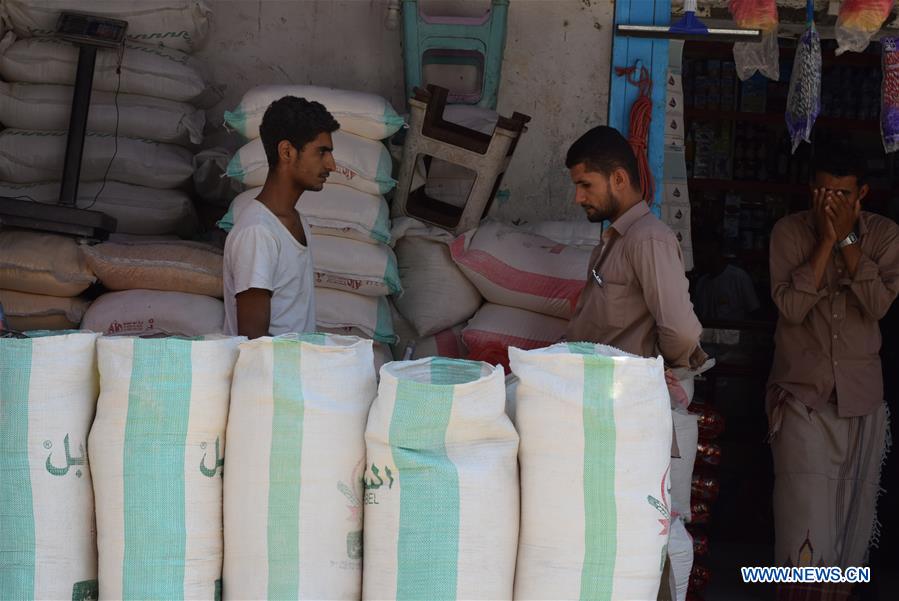 ?
?A vendor (L) sells white flour to customers at a public market in the southern port city of Aden, Yemen, April 30, 2019. Several days ahead of the holy fasting month of Ramadan, the Yemenis, like other Muslims worldwide, flock to the local markets to prepare for the most valuable religious event. But the markets across the war-ravaged country, which usually thrive ahead of Ramadan due to a sharp increase in demand for various commodities, have seen sluggish business this year. The dire living conditions of many people in Yemen and other factors, including the decline of families' purchasing power, have negatively affected the business in Yemen's markets. (Xinhua/Murad Abdo)
by Murad Abdo
ADEN, Yemen, April 30 (Xinhua) -- Several days ahead of the holy fasting month of Ramadan, the Yemenis, like other Muslims worldwide, flock to the local markets to prepare for the most valuable religious event.
But the markets across the war-ravaged country, which usually thrive ahead of Ramadan due to a sharp increase in demand for various commodities, have seen sluggish business this year.
The dire living conditions of many people in Yemen and other factors, including the decline of families' purchasing power, have negatively affected the business in Yemen's markets.
Many families with low income, which are barely able to afford the basic goods as result of the skyrocketing prices, have decided to reduce their expenditures during Ramadan by stopping buying additional goods.
In some government-controlled southern cities including Aden, traders and business owners complained about the recession that hit the markets ahead of Ramadan.
Jamal Radwan, owner of a small store in Aden, told Xinhua that many traders stopped stocking more goods as the demand for various kinds of food have declined significantly this year.
"The business is so slow. Many families came to my store and left without buying anything after they knew the prices," he said.
"Some big merchants used to import large quantities of goods ahead of Ramadan, but this year everyone is afraid as the markets are suffering from recession," Radwan said.
For Mohsen Khaled, a wholesaler, the country's turbulent economic situation and the collapse of Yemen's national currency were the key reasons that led to the recession.
"The economic situation is very bad as we are still in a war that is aggravating. Most of the Yemeni families lost their income sources during the past years," he told Xinhua.
He said that the sales have dropped dramatically compared with last year, because the country's economy continues to deteriorate.
All sellers believed that the situation is unlikely to change in the near future, as the chance to reach a longstanding political solution to the current crisis seems pretty dim.
In addition, the continuing depreciation of Yemeni riyal further worsened the economic condition of the country. In the street markets in Aden, one U.S. dollar is traded for 534 riyals, up from 215 riyals before the war.
Um Abdul-Kareem, a housewife shopping at a grocery store in Aden, said that for this year's Ramadan, she will drop a lot of things from her shopping list and only get the necessary items due to the high prices.
"I really wanted to buy many things like in past years, but the salary of my family's breadwinner is not sufficient to buy them all," she said.
Many other Yemeni families, who were badly affected by the protracted military conflict that is still raging in many provinces of the country, mainly depend on humanitarian aid to obtain Ramadan food.
Um Fatima, a displaced woman, said her family was still waiting for assistance from charity organizations.
During Ramadan, which is to begin in early May this year, Muslims all over the world abstain from eating and drinking from dawn to dusk.
Immediately after sunset, families, neighbors and friends share the Iftar meals to break their fast together.
Yemen has been locked in a civil war since the Shiite Houthi rebels overran much of the country militarily and seized all northern provinces, including the capital Sanaa, in 2014.
Saudi Arabia leads an Arab military coalition that has intervened in Yemen's conflict since 2015 to support the government of President Abd-Rabbu Mansour Hadi after Houthi rebels forced him into exile.
The prolonged military conflict has aggravated the suffering of Yemenis and deepened the world's worst humanitarian crisis.



